On Feb. 13, many McGill student groups shared posts on social media advertising a new online platform designed for university students: Sidechat. Sidechat’s launch at McGill was accompanied by heavy marketing, with free cookies given to those who created an account, and money being offered to anyone who reposted the app on their social media accounts.
Sidechat is similar to Reddit, but it is a university-exclusive platform. The company describes it as “the best way to connect with your college community and students around the country.” All users on the app are anonymous. Since its launch at Tufts University in April 2022, the founders of Sidechat have been trying to expand to several universities in the U.S., and now Canada. McGill’s launch was accompanied by advertisements from meme accounts and student organizations such as Spotted: McGill University and McGill Women in Computer Science (McWiCS).
Another component of Sidechat’s marketing strategy is offering financial incentives to its promoters and those who sign up. Those who shared the link to download the app on their Instagram Stories received $20.
The marketing initiative was not limited to the virtual sphere. Sidechat also tabled around campus—even at the entrance of Bar des Arts (BdA) where promoters offered customers tokens for free drinks if they joined the app.
“We offer free stuff in exchange for downloading the app,” Emmah Platt, U3 Arts, told The McGill Tribune as she promoted Sidechat at BdA. “Before the first day that it launched, we were giving away free money and free cookies. Now, we’re giving away free drinks.”
According to Platt, Sidechat paid students $20 an hour to advertise the app around campus.
“I did it because I had a friend […] who knew the person running or is involved in Sidechat, and I needed extra money,” Platt said. “And what a good way to meet new students.”
Despite Sidechat’s marketing efforts, many didn’t sign up as they felt the app does not offer any new services or ways to connect with fellow students.
“Their marketing strategy is very good. They really built up some brand name recognition, but I wouldn’t say that any of it made me want to download the app,” Simon Guistini, U0 Arts, said in an interview with the Tribune. “I think it’s unnecessary, and it’s just trying to do what social media does and try to make it niche, but it doesn’t need to be. Social media should be general, not niche.”
Sophia Micomonaco, U0 Arts, is also hesitant to download Sidechat. She finds that despite the app’s tempting marketing strategy, she is reluctant to promote it because she believes it lacks novelty.
“All I have seen is their crazy marketing scheme where they offer you a free cookie, which is a good marketing scheme, but I’m not sure I buy into it,” Micomonaco said. “Even though seeing other people do it and say, ‘oh my god, you get 10 dollars or whatever,’ is kind of enticing […] I don’t think it’s worth it.”
Platt, however, says the fruits of Sidechat’s strong marketing have been reaped, as over 1,500 people downloaded it on its launch day. On the other hand, Micomonaco and Guistini find that figure hard to believe. Giustini knows only one person and Micomonaco knows no one who has downloaded the app.
Micomonaco also worries about the potential problematic behaviour that could crop up on an anonymous social media platform.
The anonymity afforded to Sidechat users has led to harassment and hate speech on the app at Tufts. Yik Yak, an app similar to Sidechat, has been banned on certain university WiFi networks due to the high level of harassment and hate speech reported on the app.
“What [is Sidechat] going to do to regulate certain behaviours? People can’t be held accountable for the stuff that they do. It just doesn’t add up,” Micomonaco said. Sidechat declined an interview with the Tribune.








